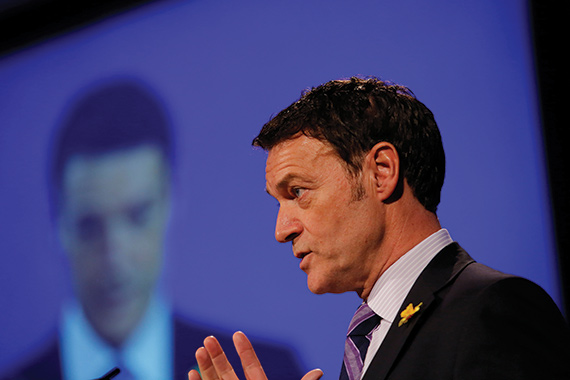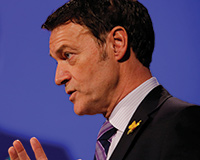
“I’m an ex-banker,” says Chris Sullivan. “I can’t tell you how pleased I am to be able to say that.”
Not just an ex-banker: until the turn of the year, Sullivan was one of the most senior bankers in the UK. He spent 40 years with RBS, including 11 on the executive board and one as deputy chief executive.
“I think it maybe qualifies me for a position with Bear Grylls on the Survivor series,” he says, with a smile. “I think I counted that I had 43 different colleagues on that board at different points during that period of time, and saw out two chief executives. I definitely decided not to see out the third.”
Having outlasted both Fred Goodwin and Stephen Hester, that third chief executive was Ross McEwan. The New Zealander joined RBS in October 2013 and in February 2014 named Sullivan as his deputy.
Sullivan would, said McEwan, “use his skills and experience to oversee the restructuring of the bank so that it works to the benefit of customers, before [he retires] next year”.
His departure came sooner than expected, however. It followed a Treasury select committee hearing in summer 2014 in which Sullivan and a colleague – Derek Sach, head of the bank’s global restructuring group – were criticised for giving misleading evidence on whether the GRG was a profit centre. In a later letter to MPs, RBS chairman Sir Philip Hampton admitted some evidence given was incorrect but stressed that Sullivan and Sach “did not intend to mislead the committee”.
Despite that well-publicised skirmish, when Sullivan spoke at the Chartered Surveyors Livery Company last month – his first major appearance in front of a property audience – it was clear that he is still held in high regard.
It’s understandable. His CV places him at the heart of many of the most significant disruptions to the financial services industry in recent years. He was, for instance, chief executive of RBS Insurance (now Direct Line Group) from 2006 until 2009, and before that chief executive of the retail direct division and of retail banking, which included Tesco Personal Finance and Virgin One.
Most recently – and most relevantly – he was chief executive of the corporate banking division from August 2009 to January 2014, a division that included Lombard Asset Finance,
RBS Invoice Finance and Global Transaction Services. And GRG.
All of this experience makes Sullivan well qualified to talk about the extent to which the UK commercial banking industry is sophisticated enough to learn from its mistakes. He is not overly optimistic.
In 2009, when he took over the corporate bank, Sullivan inherited a loan book of about £110bn. With the bad bank already taken out, that included about £47bn of commercial property lending in the UK. About 70% of all loans written by banks in 2007 were for commercial property, Sullivan says: “I think it’s fair to say that the property industry and banking are inextricably linked.”
Is that healthy? “No, it creates in the banking sense what they call a concentration risk,” he says. “If you have extreme volatility in any particular element of your collateral, or any customer, or any derivative aspects, then you are likely to have extreme results. And extreme results tend to lead to extreme behaviour.”
Could it happen again? Yes, says Sullivan.
“Bankers don’t learn the lessons. Big institutions don’t learn the lessons of the cycle. If I look through my career – four cycles, four recessions – the same mistakes were made by banks in every single one of them. Exactly the same mistakes. And if you look at each other and think, well, if the determinant of intelligence is that you learn from your mistakes, then it’s not an intelligent industry.”
Not sophisticated enough
So far, so bleak. And worse, perhaps, Sullivan also says the domestic banking business does not compare well with its global peers.
“I have looked at banks all over the world, and banking systems all over the world, and I would say that the UK banking industry is not sophisticated enough. It’s certainly not as sophisticated as places like the United
States, for instance. And so what you find in the UK is that banks work much more around supply and demand of money and loans, and that affects pricing and risk, and they don’t actually take
enough cognisance of the real risks in the business that they do. So you end up with a situation where, at the high point of the cycle, you are actually under-pricing risk, and you are overvaluing the collateral.
“What do you do about that? How can you change that cycle? Well, my view – and I’ve been peddling this for six or seven years – is that there are a set of measures that you can look at which are macroeconomic, and there are some more micro or more specific issues around the banking industry. If you were to track them both across the industry and within your institutions, you would actually say at a certain point, which might be where the economic cycle is still rising, stop lending. Or, do not lend at any more extreme terms than you currently do.”
Do this, and get the timing right, says Sullivan, and banks would avoid unprofitable lending, negate the need to write off significant chunks off debt and emerge “lean and clean”.
You would, he says, be “an absolute hero”.
“If you can stay clean at that period of the cycle, then as the recession hits, when everybody else is dealing with trying to get rid of the problem assets that they have got, you’re not. When everybody else has got too much cost in the business, you haven’t. And you become the ultimate predator.”
But – and there was always going to be a “but” – banks aren’t structured that way. “The problem is that bank chief executives get fired if they don’t grow as fast as the other banks, so the teams don’t stay in place long enough.”
Time to work together
Is regulation the answer? Not in its current form, says Sullivan. Regulating more around behaviours and metrics and intervention might work, he says, but imposing regulatory solutions around levels of capital only risks deepening the problem.
“It needs to be a bit more sophisticated than that. The industry and banks need to work together. Banks need to be much more responsible about the measures, and the measures must be long term.
“And we are woefully short across not just banking, but across this country, of anybody who thinks on a long-term basis.”
Did banks cause the crash?
“I have spent my life over the last five or six years going around being accused of not lending enough money,” says Sullivan. “Or being accused of causing the great financial crash. Banks didn’t cause it. Banks were very much the facilitators of it, but there were a hell of a lot of other people involved in causing that.
“If you think about the economies whose upcycles carried on, on the back of low-cost debt to people who couldn’t afford the debt, it was ridiculous. And governments were very much part of that. We were all very much part of that.”
But it wasn’t just consumer debt. Property lending played a very specific role too.
“I lost count of the numbers of property loans that I was seeing in the stress scenario and in recovery that were for businesses where the properties had absolutely nothing to do with the businesses.
“Good businesses were trying to support property loans that were pure speculation, and actually bankers were as well.
“We had far too many bankers who were living off the back of introductions from brokers for property deals in Glasgow, when the people were in Truro.”
damian.wild@estatesgazette.com











